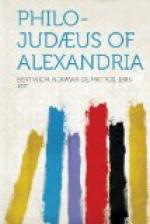From the positive side Philo stands for the spiritual significance of the religion. Judaism, which lays stress upon the law, the ceremonial, and the customs of our forefathers, is threatened at times with the neglect of the inward religion and the hardness of legalism. Not that the law, when it is understood, kills the spirit or fetters the feelings, but a formal observance and an unenlightened insistence upon the letter may crush the soul which good habits should nurture. Religion at its highest must be the expression of the individual soul within, not the acceptance of a law from without. Although Philo’s estimate of the Torah is from the historical and philological standpoint uncritical, in the religious sense it is finely critical inasmuch as it searches out true values. Philo looks in every ordinance of the Bible for the spiritual light and conceives the law as an inspiration of spiritual truth and the guide to God, or, as he puts it sometimes, “the mystagogue to divine ecstasy.” For the crown of life to him is the saint’s union with God. In mysticism religion and philosophy blend, for mysticism is the philosophical form of faith. Just as the Torah to Philo has an outward and an inward meaning, so, too, has the religion of the Torah; and the outward Judaism is the symbol, the necessary bodily expression of the inward, even as the words of Moses are the symbol, the suggestive expression of the deeper truth behind them. Yet mystic and spiritual as he is, Philo never allows religion to sink into mere spirituality, because he has a true appreciation and a real love for the law. The Torah is the foundation of Judaism, and one of the three pillars of the universe, as the rabbis said; and neither the philosopher nor the mystic in Philo ever causes him to forget that Judaism is a religion of conduct as well as of belief, and that the law of righteousness is a law which must be practiced and show itself in active life. He holds fast, moreover, to the catholicity of Judaism, which restrains the individual from abrogating observance till the united conscience of the race calls for it; unless progress comes in this ordered way, the reformer will produce chaos.




